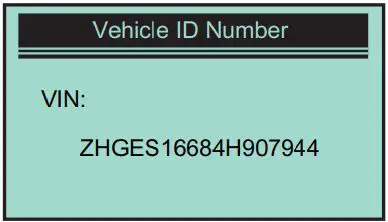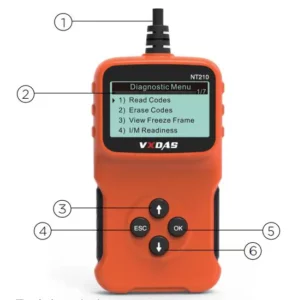
VXDAS Automobile OBD Diagnostic Instrument User Manual
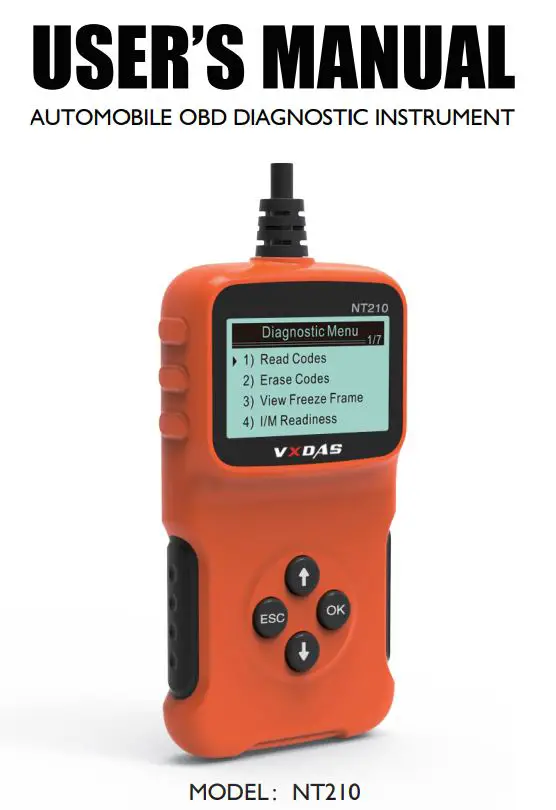
Safety measures and warning
For preventing physical injuries, or causing damage for the vehicles and decoder, please read this operating manual before using this instrument on the vehicle, and comply with the following safety measures:
- Detection shall be carried out in safe environment.
- Keep clothes, hair, hands, tools, test equipment away from all motor heating components.
- Operate the vehicle in a well-ventilated area: waste gas is harmful to the human body.
- Place a block plate in the front of the drive wheel, make sure the vehicle is guarded during operating the test.
- Be more careful when operating near the ignition wire and spark plug of ignition coil distributor cover. These components will generate the dangerous voltage when the engine is running.
- Place the gearbox in PARK (automatic gearbox) or NEUTRAL (manual gearbox), and make sure the parking brake is connected.
- Put the fire extinguishers applied to petrol/ chemical electrical fire near it.
- Do not connect or disconnect any test equipment when ignition switch is opening or engine is running.
- Wear the eye protective device accorded with ANSI standard.
- Keep decoder dry, clean, not adhere oil / water or lubricants. Wipe the decoder by a clean with the gentle cleaner if necessary.
Decoder operation
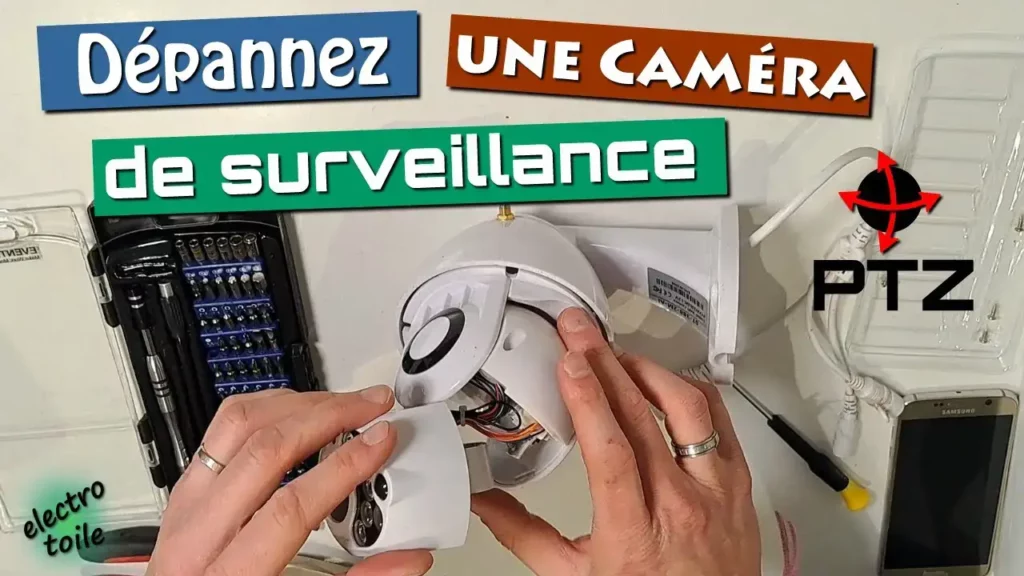
Tool description
- Diagnostic joint – Connect the decoder to the vehicle data link connector (DLC).
- LCD display – Display the detection result.
- Up roll button – Roll the menu and submenu in menu mode. When several dT are retrieved, it will move up to the previous screen by the current screen to obtain the other DTCS and definitions.
- Return button – Cancel the selection (or operation) in the menu or return to the menu. Long press for 3 seconds, it is also used to set the unit.
- Confirm button – confirm the selection (or operation) in the menu. Applied to move down to the next screen to get the other data.
- Down roll button – Roll the menu and submenu in menu mode. When several dT are retrieved, it will move down to the next screen by the current screen to obtain the other DTCS and definitions.
Specification
Display: Badit, 128 * 64 pixel display
Working temperature: 0~60¥ (32~140)
Storage temperature: -20~70¥ (-4~158)
External power supply: Vehicle batteries supply 9.0 to 16.0V
Size: Length: 95.5 mm, width: 72.1 mm, height: 22.2mm
Power supply of vehicle
Vehicle data link connector (DLC) supplies the power to decoder. Open the decoder by the following steps
- Take down DLC cover plate from the vehicle Some vehicles have the plastic cover plate, need to take down it before inserting OBD2 cable.
- Insert OBD II wire to vehicle DLC.
Product Setup
Carry out the adjustment and setting for the decoder as below:
- Language: Select the required language.
- Measurement unit: Set the measurement unit as imperial or metric units.
- Contrast adjustment: Adjust the contrast of LCD display screen.
• The settings will be always same, until changing as the current settings.
Enter setting menu
The second start screen, press Up/Down button enter the system setting menu. Adjust and set by the following setting options.
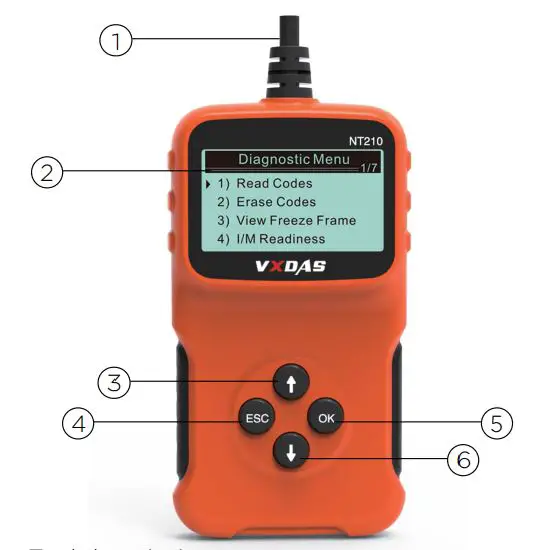
The digital “x/x” on the upper right corner of the screen show the total numbers of items under the menu and the serial number of the current selected item.
Language setting
English as default. In the system setting menu, press Up/Down button to select the language, and then press Return/Confirm button.
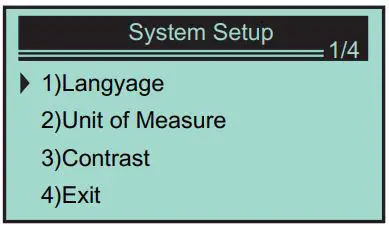
Press Up/Down button to select the required language, press Return/Confirm button to save the selection, and return to the previous menu.
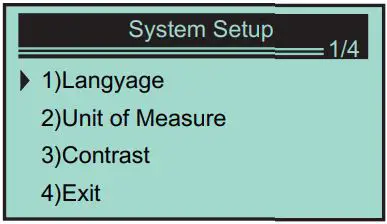
Measurement unit is metric unit by default In the system setting menu, press Up/Down button to select measurement unit, and then press Return/Confirm button.
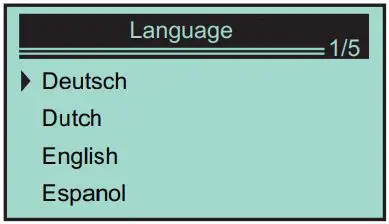
In the measurement unit menu, press Up/Down button to select the required measurement unit.
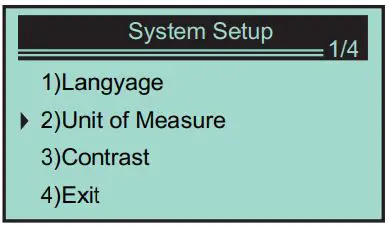
Press Return/Confirm button to save the selection, and return to the previous menu.
Contrast adjustment
In the system setting menu, press Up/Down button to select the contrast, and then press Up/Down button.
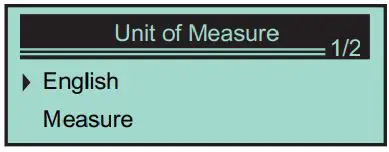
In contrast menu, press Up/Down button to adjust the contrast.
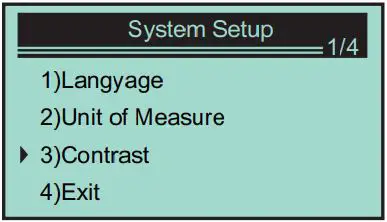
Press Return/Confirm button to save the settings and return to the previous menu.
Exit the system setting
Press Return/Confirm button to return to start menu.
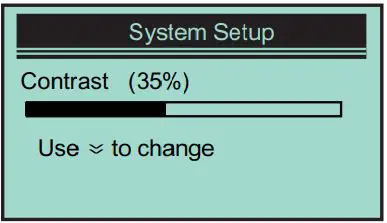
DTC Trouble Code Search
OBD-II search powered by dot.report
Application range of vehicle
This OBD II / EOBD decoder is specially applied to all the vehicles that accorded with OBD II standard, including the vehicles for preparing the next generation of protocols – controlling the area network (have the capacity). All the vehicles selling in USA as required by United States Environmental Protection Agency, and 1996 newer (automobile) light trucks must be accorded with OBD II standard. Including all the domestic, Asian and European vehicles. A small amount of 1994 and 1995 petrol vehicles are accorded with OBD II standard. If need to verify if 1994 or 1995 vehicles are accorded with OBD II standard, please check the vehicle emission control information (VECI) label, most vehicles are stuck this label under the engine jacket or near the radiator. If the vehicle is accorded with OBD II standard, and then its label is marked with “OBD II certification”. In addition, the government laws and regulations require all the vehicles that are accorded with OBD II standard must have “General” 16 pin data link connector (DLC). If your vehicle is accorded with OBD II standard, there must a 16 pin DLC (data link connector) below the instrument panel, and a vehicle emission control information label states the vehicle is accorded with OBD II standard.
OBD II diagnosis
When diagnostic instrument detects multiple vehicle control modules, the system will prompt you to select the module that can retrieve the data. Power assembly control module [PCM] and gearbox control module [TCM] are the commonly options.
- Caution: Do not connect or disconnect any test equipment when ignition switch is opening or engine is running.
- Turn off ignition switch.
- Find the vehicle 16 pin data link connector (DLC).
- Insert OBD II wire to vehicle DLC.
- Turn on ignition switch. Engine stops or runs.
- Press Return/Confirm button to enter diagnostic menu. A series of OBD2 protocol information will be displayed on the display screen, until the vehicle protocol is detected.
If decoder can not communicate with the vehicle ECU (engine control unit), “Connection error!” will be displayed on the display screen.
✓ Confirm ignition switch is turned on;
✓Check if OBD II connector of decoder is connected to vehicle DLC;
✓ Confirm the vehicle is accorded with OBD2 standard;
✓ Turn off ignition switch and wait for 10 seconds. Turn on ignition switch again, repeat the steps in 5.
If “Connection error” information still appears, and then it may be the communication between decoder and vehicle has the problem. Please contact the local dealer or the Customer Service Department of the manufacturer for getting the help.
After the system status (Diagnostic indicator state, diagnostic code counting, monitor state) is displayed, wait for several seconds or press any key to display the diagnostic menu.
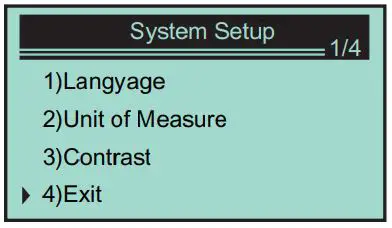
Read code
Press Up/Down button to select the read code from diagnostic menu, and then press Return/Confirm button.
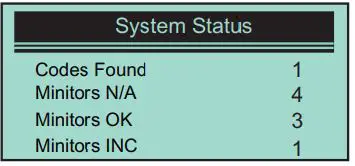
If multiple modules are detected, the system will prompt you to select the module before testing.
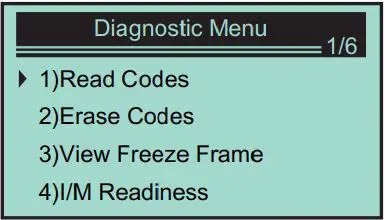
Press Up/Down button to select a module, and then press Return/Confirm button. Read DTC and its definition on the screen
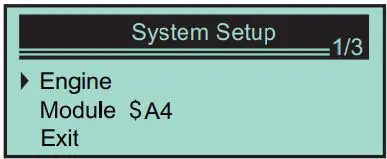
Control module No., diagnostic code order, total numbers of code to be detected and types of code (general or specified by manufacturer, storage or code to be processed) will be displayed on the upper right corner of screen.
If find out multiple DTC, please press Up/Down button by the requirements, until all codes are all displayed. If not detect the code, “Code is not stored in module!” information is displayed on the screen. If the retrieved DTC contains any code specified by manufacturer or the enhanced codes, and then “Controlled by manufacturer” is displayed on the screen.
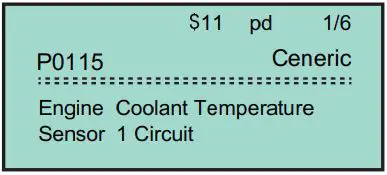
Press Return/Confirm button to return to the previous menu.
Delete the code
Caution: Delete the diagnostic code of decoder may not only delete the code on truck-mounted computer, but also delete “Freeze Frame” data and the enhanced data of the manufacturer. In addition, I/M ready monitor status of all vehicle monitors are reset as non-ready and non-finish state. Do not delete the code before the technicians check the system completely. Implement this function by the key on (KOEO) engine. Do not start the engine. If decide to delete the diagnostic code, please press Up/Down button to select “Delete the code” from the Diagnostic menu, and then press Return/Confirm button.
Diagnostic Menu 2/6 1)Read Codes
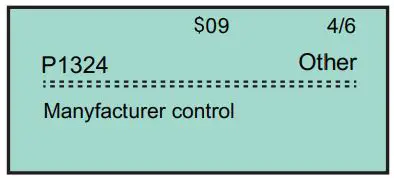
A warning message appears, and needs you to confirm.
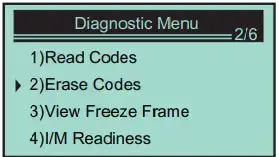
If go on deleting the code, please press Return/Confirm button to delete. If the code is deleted successfully, and then “Delete is finished !” information is displayed on the screen. If the code is not deleted successfully, and then “Delete is failed. Rotate the key in the case of engine is turned off !” is displayed on the screen. Wait for several seconds or press any button to return to Diagnostic menu. If you want to go on deleting the code, press Up/Down button to select, and press Return/Confirm button. “Cancel the command” information is appeared. Press any button or wait for several seconds to return to Diagnostic menu.
Read Freeze Frame data
If need to read Freeze Frame, press Up/Down button to select Freeze Frame diagnostic menu, and then press Return/Confirm button.
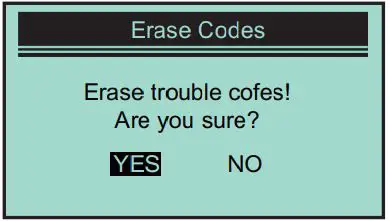
If multiple modules are detected, the system will prompt you to select the module before testing.
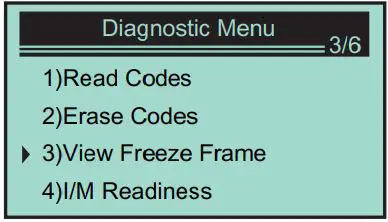
Press Up/Down button to select a module, and then press Return/Confirm button.
Wait for several seconds, until the decoder PID mapping is verified.
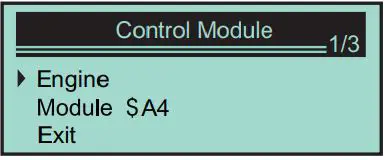
If the retrieved information covers multiple screens, and then need to press “Up/Down” button, until all the data is displayed.
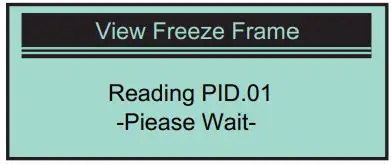
The digital “x/x” on the upper right corner of the screen show the total Frame coverage of retrieved data on the screen and the serial number of the current displaying data. If no available Freeze Frame data, “Freeze Frame is not stored” information will be displayed on the screen. Press Return/Confirm to return to Diagnostic menu
Retrieve I / M ready state
I/M ready function is used to check the operating situation of vehicle emission system that is accorded with OBD2 standard. This is a very good function before checking if the vehicle is accorded with the state emission plan. Some newest vehicles models may support two types of I/M ready test:
A. DTC has been deleted – Shows the display status since DTC has been deleted.
B. This Drive Cycle – Shows the monitor status since the current drive cycle has been started.
I/M ready result is “No”, it is not sure shows the tested vehicle can not pass the state I/M check. Some states permit one or multiple such monitors are “Non-ready” passed the emission check.
✓ “Confirm” – Shows the diagnostic test for the special monitor being checked has been finished.
✓ “INC” – Shows the diagnostic test for the special monitor being checked has not been finished.
✓ “Not applicable” – The vehicle doesn’t support the monitor. Press Up/Down button to select I/M ready from Diagnostic menu, and then press Return/Confirm button.
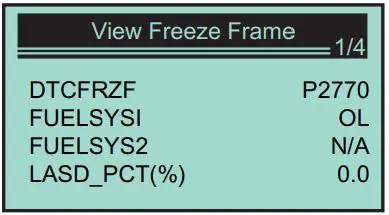
If multiple modules are detected, the system will prompt you to select the module before testing.
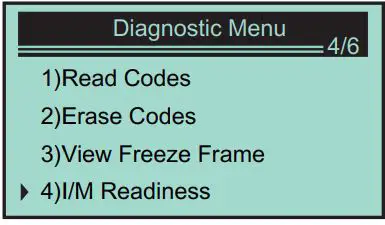
Press Up/Down button to select a module, and then press Return/Confirm button.
Wait for several seconds, until the decoder PID mapping is verified.
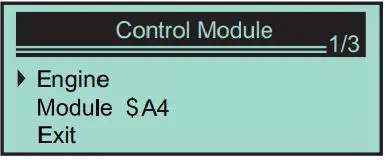
If the vehicle supports two types of test. Two types are displayed on the screen for selecting.
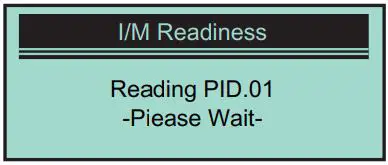
Press Up/Down button to read MIL light status (“ON” or “OFF”) and the following monitors: Press Up/Down button to read MIL light (“ON” or “OFF”) and the status of the following monitors:
- Misfire monitor– Misfire monitor
- Fuel System Mon– Fuel system monitor
- Component– Comprehensive component monitor
- EGR– EGR system monitor
- Oxygen Sens Mon– Oxygen sensor monitor
- Catalyst Mon– Catalyst monitor
- EVAP System Mon– Evaporation system monitor
- Oxygen Sens her — Oxygen sensor heater monitor
- Sec Air System– Secondary air monitor
- Hid Catalyst– Heating catalyst monitor
- A C Retrig Mon–A / C system monitor
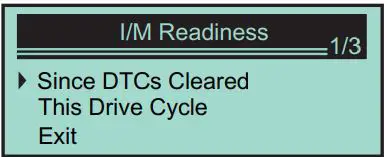
If the vehicle supports “This Drive Cycle” ready test, the following information will be displayed on the screen:
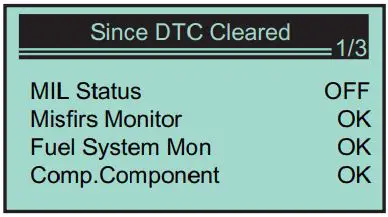
The digital “x/x” on the upper right corner of the screen show the total coverage of retrieved data on the screen and the serial number of the current displaying data. Press Up/Down button to return to the previous menu.
Read the vehicle information
Vehicle information function can retrieve vehicle identification number (VIN), calibration sign, calibration verification number (CVN) and the models above 2000 support the vehicle performance tracking of mode 9.
In Diagnostic menu, press Up/Down button to select the vehicle information. Press Return/Confirm button.
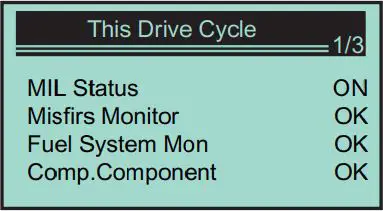
Wait for several seconds or press Return/Confirm button to go on.
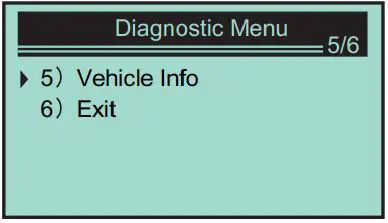
If the vehicle doesn’t support this mode. “The selected mode is not supported !” information is displayed on the screen. If multiple modules are detected, the system will prompt you to select the module before testing.
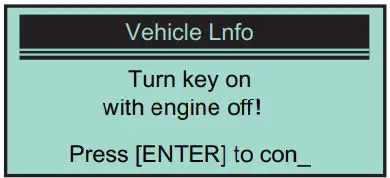
Press Up/Down button to select a module, and then press Return/Confirm button.
When decoder is reading the vehicle information, please wait for several seconds.
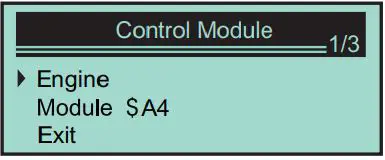
In vehicle information menu, press Up/Down button to select the available items you want, and then press Confirm button.
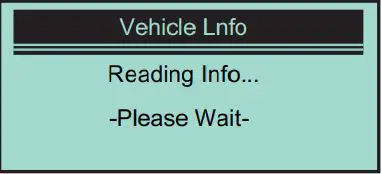
Read the retrieved vehicle information on the screen.
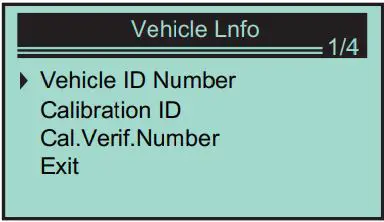
Press Return/Confirm button to return to the previous menu.
Points for Attention
This product is incompatible with new energy vehicles, hybrid vehicles and vehicles not under the OBD2 protocol.
Disclaimer Conditions
We are committed to providing unparalleled customer support to our customers before and after sales. Below we offer our exemption for this product: If any of the following conditions are met, the customer shall not enjoy the benefits covered by this limited warranty:
a) Products are damaged due to abnormal use, abnormal conditions and improper storage, such as exposure to humidity or dampness, unauthorized modification, unauthorized maintenance, misuse, negligence, abuse, accident, modification, improper installation or other non-malfunctioning behavior , including damage caused by transportation.
b) Our company is not responsible for damage to products caused by external causes (such as collision with objects) or fire, flood, sand, dust, storm, lightning, earthquake or weather conditions, irresistible acts of natural disasters or leakage of batteries, theft, fuse breaking, incorrect use of any power source.
